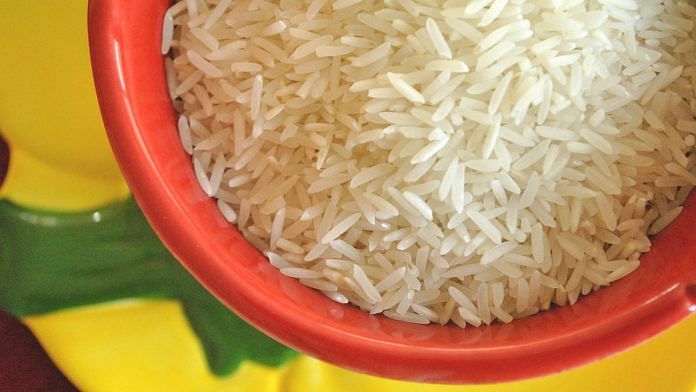New Delhi: India and Pakistan, the two basmati rice-producing nations in the world, are expected to share ownership of the coveted branding rights for basmati rice in markets of the European Union (EU).
According to sources, both nations are likely to reach an agreement after opposing each others’ claims for getting Protected Geographical Indication (PGI), or GI tag, for the product in the EU.
“It seems both sides are now working out a solution wherein both are planning to share the ownership as India and Pakistan are the only two basmati rice producers in the world,” a source familiar with the matter told ThePrint.
“The matter also involves the livelihood of farmers on both sides who depend only on basmati rice production,” the source added. “This is also a major revenue generation source for both countries.”
The stand-off began when India filed a claim in the EU on 11 September 2020, seeking GI status for its basmati from the union’s Council on Quality Schemes for Agricultural Products and Foodstuffs. This status would’ve provided New Delhi a monopoly over basmati rice markets in Europe, as names of products registered as GIs are legally protected against imitation and misuse within the EU and in non-EU countries where a specific protection agreement has been signed.
According to the EU website, the GI tag emphasises relationships in specific geographic regions and the name of the product attributing particular quality, reputation or other characteristics.
Pakistan, the only other basmati rice exporter in the world, however, vehemently opposed India’s move. It filed a counter-petition in late 2020.
Also read: Why pulses & oilseeds have got higher MSP hike than paddy, cereals this year
The stand-off
Granting the basmati GI tag to India would’ve adversely affected Pakistani exports in major markets such as the EU.
Pakistan already lags behind on this front, with an estimated basmati export of $2.2 billion annually, as compared to India’s $ 4.8 billion.
In 2006, the EU had recognised basmati as a joint product of India and Pakistan but New Delhi has been trying to be the sole owner of the GI tag.
A second source said India would have to wait until September of this year regarding its claim on the GI tag.
“India will have to wait at least until September 2021 to get GI tag on its basmati rice exports to the EU as matters got prolonged after the EU accepted Pakistan’s official notice of opposition against India’s claim over basmati rice,” the source said.
This is because, the source added, the EU permits all stakeholders to lodge their opposition from the time India’s filed its application.
“The commission regards the consultations process as confidential between applicant and opponents and does not reveal the identity of the opponents nor content of oppositions until the process is complete,” the source said. “The consultations last for three months, and have been extended to a further three months at India’s request, which is until September 2021.”
Perks of GI tag
According to estimates, the GI tag for Indian basmati could’ve boosted the country’s exports to the European markets from the current $250 million to $500 million. Basmati rice provides better returns, at a price of $868 or Rs 63,575/ tonne, which is double the non-basmati rice export price at $366 or Rs 26,800/tonne.
According to Union Commerce ministry and All India Rice Exporters Association data, India exported $245.4 million worth of basmati rice to the EU in 2020-21 as against $207 million in 2019-20.
In quantitative terms, it was 2.88 lakh tonnes compared to 2.11 lakh tonnes the previous year.
Similarly, Pakistan exports between 5-7 lakh tonnes of basmati rice to the world, of which 2-2.5 lakh tonnes is shipped to EU countries.
The boost in basmati export to EU with GI tag would’ve been a relief for India amidst a slide in export to major export destinations in West Asia, which account for more than 80 per cent of the product, owing to new stringent pesticide norms.
The basmati rice export from India to Iran has plunged from $1,559.63 million in 2018-19 to $590.67 million in 2020-21. Export of basmati to the UAE also dipped from $2,055.22 million to $203.59 million in the corresponding period.
In a report, the Agriculture and Processed Food Products Export Development Authority of India pointed out that Pakistan is seeking to benefit from India’s falling exports to Iran. Iran may also not start importing basmati rice from India until a political resolution is in place as owing to US economic sanctions, New Delhi stopped importing crude oil from Tehran.
The unfettered access to the basmati rice market of the EU is also crucial and sought after because according to analytical reports, the European basmati rice market which was valued at $491 million in 2016, is expected to reach $615 million by 2023, registering a Compound Annual Growth Rate (CAGR) of 3.2 per cent from 2017-2023.
(Edited by Arun Prashanth)
Also read: Sesame, the super seed that got the highest MSP jump from Modi govt



